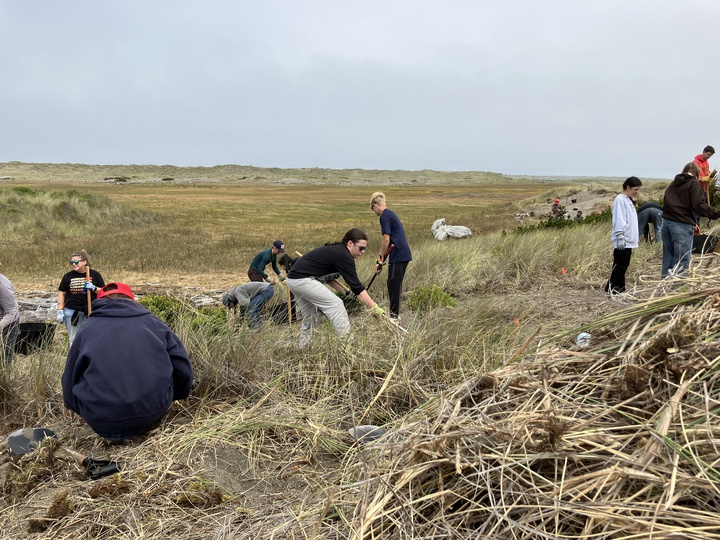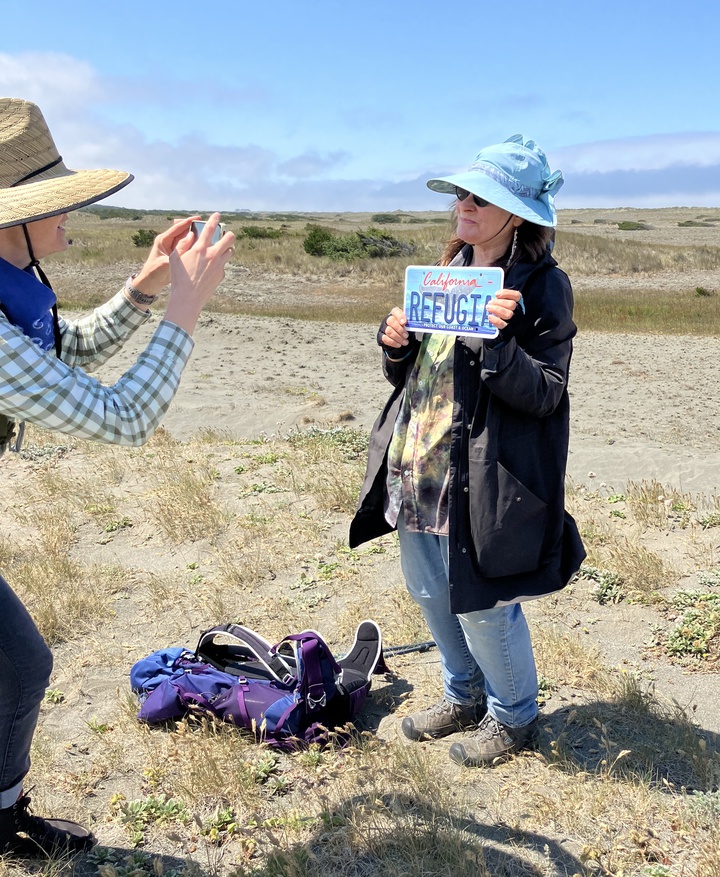Jessica Cejnar Andrews / Wednesday, July 10, 2024 @ 4:51 p.m. / Community, Environment
Tolowa Dunes Stewards Director Credits Volunteer Work, Whale Tail Grant, For Successful Snowy Plover Nests

About 60 teen volunteers with the Sierra Service Project pulled European beach grass at the Lake Earl Wildlife Area on Wednesday. | Jessica C. Andrews
(Updated at 4:50 p.m. to clarify timeline and funding for the Tolowa Dunes Stewards' ongoing efforts to conduct habitat restoration near lakes Earl and Tolowa.)
Sandra Jerabek peered through the fog veil, contemplating the 60 or so hoodie-clad teenagers armed with shovels and gardening gloves pulling European beach grass alongside Lake Earl.
Jerabek, director of the Tolowa Dunes Stewards, could trek a few more feet down the trail to view the tangible efforts of the kids’ work — a thriving dune habitat crowned with several native plants, including the endangered silvery phacelia.
But what Jerabek and her young volunteers couldn’t see Wednesday were the western snowy plover nests in the sand dunes near the lagoon’s mouth. It's a success story that may not have been possible had it not been for a $1.7 million State Wildlife Conservation Board grant Tolowa Dunes Stewards received in 2012 and its decade-long partnership with the Sierra Service Project
“For more than 40 years, there were no successful snowy plover nests here in Del Norte,” Jerabek told the Wild Rivers Outpost. “We had young birds fledge for the first time in more than 40 years — seven birds. This was a super big deal that they nested where we were removing beach grass and they made it to fly out into the world.”
For about two decades, Jerabek and a group of 15 volunteers have pulled European beach grass at Tolowa Dunes State Park. The invasive plant crowds out several native plant species including the silvery phacelia.
Thanks to California Conservancy grant dollars the organization received in 2009, the Coastal Commission granted the Stewards official permission to include the Lake Earl Wildlife Area in its habitat restoration work, according to Jerabek.
This was in 2012, she said, but if it wasn't for the Sierra Service Project "coming to the rescue" in 2014, that work would not have started.
“The story today, to me, is about the power of volunteering,” she told the Outpost. “The Coastal Commission gives you two years to start a project, really. And if you don’t start it, you have to renew your permit, which nobody wanted to do. The Sierra Service Project came to our rescue along with some local volunteers.”
According to Jerabek, the Coastal Commission's Whale Tail license plate grants fund the Stewards' work with local youth as well as the Sierra Service Project's involvement in habitat restoration.
Jerabek credits a $1.7 million Wildlife Conservation Board grant the Tolowa Dunes Stewards received in 2023 allowed the organization to use heavy equipment to bury the invasive beach grass in the foredune alongside the lagoon.
A smaller grant has also allowed the Tolowa Dunes Stewards to pay Northwest Youth Corps crews and deploy heavy equipment to remove beach grass.
The Sierra Service Project has offered home repair projects throughout in native and non-native rural and urban communities since 1975. The nonprofit has partnered with organizations in Del Norte County since 2013.
This year, about 300 teens and young adults are expected to visit Del Norte County, building wheelchair ramps, hand rails and other projects to increase accessibility for local senior citizens. They’re also working in local community gardens and, in addition to helping the Tolowa Dunes Stewards rid the Lake Earl Wildlife Area of beach grass, have conducted English ivy pulls.

Tolowa Dunes Stewards director Sandra Jerabek credits the Whale Tail Grants Program for enabling the organization to spearhead invasive plant removal near Lake Earl. | Jessica C. Andrews
According to Addison DaDeppo, site director for the Del Norte Sierra Service Project, between 50 and 60 teens visit the area each week.
“This week we have an all-boys school here,” she said, adding that the Boy Scouts and Girl Scouts have also brought groups to Del Norte County. “A lot of our volunteer base is youth groups. They come in their separate groups and then we mix them all up in work teams, so it’s [with] people they don’t know.”
It’s the same with the adults who accompany the youth, DaDeppo said. They get a taste of the different projects and on Wednesdays come together for “Dune Wednesday,” she said.
The Sierra Service Project also spearheads year-round programs in Sacramento, which is where the organization is based, DaDeppo said.
When it first came to Del Norte County, the Sierra Service Project had worked with the Tolowa Dee-ni’ Nation’s housing authority, Executive Director Megan Taylor said. They became acquainted with the Tolowa Dunes Stewards through Lorie Poole, who had been the recycle coordinator for Recology Del Norte, Taylor said.
Since then, SSP volunteers have worked alongside paid crews through the Northwest Youth Corps to remove nearly 7 acres of European beach grass, Jerabek said. According to her, the value of their work totals about $250,000. Jerabek added that for two years volunteers couldn’t work due to the COVID-19 pandemic.
When they’re not pulling European beach grass, SSP volunteers receive a lesson in ecology from Tolowa Dunes State Park interpreter Kyle Buchanan. He said he focuses on the longevity of the work they’re doing, comparing the work to a digital pixelated image that’s part of a larger picture.
Buchanan said he also mentions the Pacific Flyway, the north-south corridor for migratory birds between Alaska and South America, especially considering that many of the volunteers are from more urban and suburban areas.
“No matter where they are, these birds rely on this sort of work,” Buchanan said. “Hopefully this can be a catalyst to the work that we’ll do with the future and [the teens] can bring it home with them.”
CLICK TO MANAGE